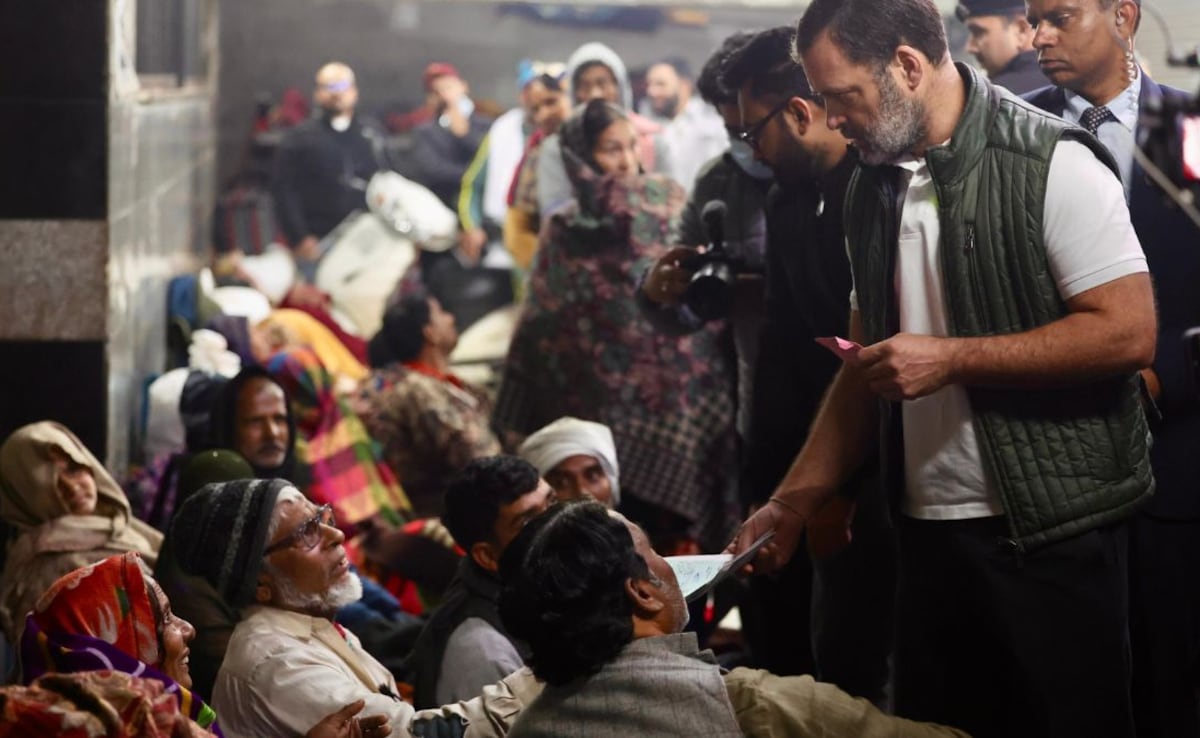Congress Leader Highlights Government Apathy in Meeting with Families Facing Medical Crises
New Delhi—In a heartfelt engagement that has captured the attention of the public, Congress leader Rahul Gandhi met with families of patients camping outside the All India Institute of Medical Sciences (AIIMS) in New Delhi on Thursday night. The meeting highlighted the alarming conditions that these families endure in their quest for medical treatment, as they are forced to seek refuge on footpaths, roads, and even subways in the face of biting winter chill. Gandhi’s visit comes amid rising concerns regarding the effectiveness and compassion of both the Central and Delhi governments toward citizens in need of medical care.
The emotional encounter took place on the night of December 21, where Gandhi expressed solidarity with the families, emphasizing their struggles not only with illnesses but also with the harsh realities of homelessness in the winter season. “Burden of disease, biting cold, and government insensitivity—today I met patients and their families outside AIIMS who have come from far and wide in search of treatment. On their path to getting treatment, they are forced to sleep on roads, footpaths, and subways—just keeping a flame of hope burning amidst the cold ground, hunger, and inconveniences,” he stated in a post on social media. This display of empathy underscores the ongoing crisis in the healthcare system and the need for immediate attention to the plight of vulnerable patients.
Why This Matters: A Call for Action in Healthcare System
Families of patients facing dire circumstances descended upon AIIMS seeking access to critical medical treatment and support, yet many have expressed frustration due to lack of care and facilities. One poignant story shared during Gandhi’s visit was that of Pawan Kumar, a father whose 13-year-old daughter is battling blood cancer. The family arrived at AIIMS on December 3, but weeks later, they still have not received adequate treatment. “He (Rahul Gandhi) asked me for my phone number, and said that his team will contact me and help me as much as possible,” Kumar explained to ANI, shedding light on the desperate atmosphere surrounding the hospital. The girl’s mother further conveyed that Gandhi offered promises of cash support for her daughter’s treatment, a gesture that is both hopeful yet indicative of the dire situation families are facing.
The Congress party, in a post on X, echoed Gandhi’s sentiments, condemning the government for its apparent insensitivity and failure to address the needs of the citizens. The post highlighted that people are being forced to live under such harsh conditions, which starkly underscores the inadequacies of the current healthcare system in Delhi. The plight of these families not only reveals a lack of resources but also calls into question the overall commitment of the government to public health.
The Ongoing Health Crisis: Government Responses and Public Sentiment
The healthcare situation in Delhi and across India has increasingly come under scrutiny. Several reports have indicated that a significant number of patients are struggling to obtain timely medical assistance due to overcrowding in hospitals, lack of facilities, and inadequate government support. The scenario becomes even more alarming during the winter months when low temperatures and cold waves exacerbate the suffering of those already vulnerable due to serious health conditions.
As per the report by The Hindu, the current health infrastructure is facing unprecedented challenges, especially in the wake of the COVID-19 pandemic, which has laid bare the fragility of the system. The underfunding of public health facilities and the increasing privatization of healthcare services have contributed to a scenario where many families are left with no choice but to camp outside hospitals in dire circumstances.
This situation is not unique to AIIMS; it reflects a broader issue that many government hospitals are unable to handle the influx of patients, forcing families into precarious living situations with little to no support. The responsibility of addressing these concerns lies not only with healthcare providers but also with policymakers who must prioritize investments in public health.
The meeting with Rahul Gandhi shines a light on these systemic issues and reveals the growing public sentiment that demands change. Many citizens are calling for government accountability and reform in healthcare services to ensure that no patient is left without the necessary care, especially during challenging times.
Moving Forward: Reform and Support Needed for Vulnerable Patients
In light of these challenges, it is critical for both the Central and Delhi governments to take immediate action to address the healthcare needs of the population. Long-term solutions are needed, including enhancing capacity at public hospitals, increasing the availability of essential medications, and ensuring that patients have access to social services that can provide them with basic necessities during their treatment process.
Moreover, the Congress party’s engagement with the families signifies an opportunity for political advocacy to push for reforms and better healthcare policies. As citizens and political leaders alike continue to voice their concerns, there is hope that the situation can improve for those in need.
For additional insights on the healthcare crisis in India, refer to the related articles by The Wire and BBC News that explore the intricacies of the healthcare landscape.
By shining a spotlight on the experiences of families fighting for their loved ones’ health, Rahul Gandhi’s visit serves as a reminder of the urgent need for empathy, reform, and a renewed commitment to better healthcare policies. The sacrifices made by these families must not be overlooked, and systemic changes must be implemented to prevent such insensitivity from continuing in the future.


